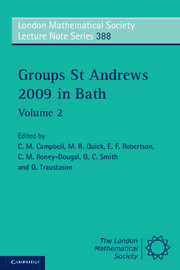Book contents
- Frontmatter
- Contents
- Introduction
- Algorithms for matrix groups
- Residual properties of 1-relator groups
- Words and groups
- The modular isomorphism problem for the groups of order 512
- Recent progress in the symmetric generation of groups
- Discriminating groups: a comprehensive overview
- Extending the Kegel Wielandt theorem through π-decomposable groups
- On the prime graph of a finite group
- Applications of Lie rings with finite cyclic grading
- Pronormal subgroups and transitivity of some subgroup properties
- On Engel and positive laws
- Maximal subgroups of odd index in finite groups with simple classical socle
- Some classic and nearly classic problems on varieties of groups
- Generalizations of the Sylow theorem
- Engel groups
- Lie methods in Engel groups
- On the degree of commutativity of p-groups of maximal class
- Class preserving automorphisms of finite p-groups: a survey
- Symmetric colorings of finite groups
- References
Algorithms for matrix groups
Published online by Cambridge University Press: 05 July 2011
- Frontmatter
- Contents
- Introduction
- Algorithms for matrix groups
- Residual properties of 1-relator groups
- Words and groups
- The modular isomorphism problem for the groups of order 512
- Recent progress in the symmetric generation of groups
- Discriminating groups: a comprehensive overview
- Extending the Kegel Wielandt theorem through π-decomposable groups
- On the prime graph of a finite group
- Applications of Lie rings with finite cyclic grading
- Pronormal subgroups and transitivity of some subgroup properties
- On Engel and positive laws
- Maximal subgroups of odd index in finite groups with simple classical socle
- Some classic and nearly classic problems on varieties of groups
- Generalizations of the Sylow theorem
- Engel groups
- Lie methods in Engel groups
- On the degree of commutativity of p-groups of maximal class
- Class preserving automorphisms of finite p-groups: a survey
- Symmetric colorings of finite groups
- References
Summary
Abstract
Existing algorithms have only limited ability to answer structural questions about subgroups G of GL(d, F), where F is a finite field. We discuss new and promising algorithmic approaches, both theoretical and practical, which as a first step construct a chief series for G.
Introduction
Research in Computational Group Theory has concentrated on four primary areas: permutation groups, finitely-presented groups, soluble groups, and matrix groups. It is now possible to study the structure of permutation groups having degrees up to about ten million; Seress [97] describes in detail the relevant algorithms. We can compute useful descriptions for quotients of finitely-presented groups; as one example, O'Brien & Vaughan-Lee [90] computed a power-conjugate presentation for the largest finite 2-generator group of exponent 7, showing that it has order 720416. Practical algorithms for the study of polycyclic groups are described in [59, Chapter 8].
We contrast the success in these areas with the paucity of algorithms to investigate the structure of matrix groups. Let G = 〈X〉 ≤ GL(d, F) where F = GF(q). Natural questions of interest to group-theorists include: What is the order of G? What are its composition factors? How many conjugacy classes of elements does it have? Such questions about a subgroup of Sn, the symmetric group of degree n, are answered both theoretically and practically using highly effective polynomialtime algorithms.
Information
- Type
- Chapter
- Information
- Groups St Andrews 2009 in Bath , pp. 297 - 323Publisher: Cambridge University PressPrint publication year: 2011
References
Accessibility standard: Unknown
Why this information is here
This section outlines the accessibility features of this content - including support for screen readers, full keyboard navigation and high-contrast display options. This may not be relevant for you.Accessibility Information
- 6
- Cited by
